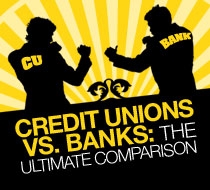//Five Fast Facts Why Credit Unions Aren’t Banks
When you walk into the credit union lobby, you may not immediately notice the differences between the credit union and a bank. Both offer similar products and services, but that’s where the similarities end. Here are five fast facts that show the major differences between banks and credit unions.
1. Credit unions are member-owned. Banks are owned by shareholders who expect a profit.
2. The credit union board of directors are unpaid members who volunteer their time and talent. They don’t do it for pay. They are credit union members who want the credit union to prosper for all members.
3. Credit union membership is limited to people who have a “common bond.” This bond can be based on a geographic community, job, religion, or other type of bond.
4. Credit unions are not-for-profit, which means they can offer lower loan rates and higher returns on savings.
5. Being not for profit, credit unions are not focused on returning profits to shareholders. Instead, credit unions place their highest priority on serving their members. This is just the tip of the iceberg. Visit your credit union today and see first-hand how being a credit union member can make a huge difference in your life.
Back to Articles











